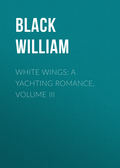
Black William
In Silk Attire: A Novel
CHAPTER XVI.
SCHÖNSTEIN
"Welcome to Schönstein!" cried the Count, gaily, as a turn in the road brought them in sight of a little hamlet, a small church, and beyond these – somewhat back from the village – an immense white house with green sunshades over the windows.
"Friend Anerley," said the Count to himself, "if you ever had a thought of paying your addresses to the lady opposite you, your case is rather hopeless now!"
Annie Brunel looked forward through the ruddy mist that the sunset was pouring over the picture before them, and thought that it was very beautiful indeed. She paid little attention to the gaunt white house. But this little village, set in a clearing of the great forest – its brown wooden houses, with their heavy projecting eaves and numerous windows; the small white church, with a large sundial painted in black on the gable; the long, sloping hill behind, covered, away even, to the horizon, with the black-green pines of the Schwarzwald – all these things, steeped in the crimson glow of the western light, were indeed most charming and picturesque.
"Why do they project the roofs so much?" she said, looking especially at the inn of the little hamlet they were approaching. "I thought these splendid old houses only existed in Swiss lithographs."
"For the snow," said the Count, grandly, as if the intensity of the Black Forest winters belonged to him. "You should see a regular snowstorm in this country, with half the houses buried, the mail-coaches turned into sledges – why, every man who keeps a carriage here must keep it in duplicate – a wheel-carriage for the summer, a sledge for the winter."
With which they drove through the village. Hans Halm, the sturdy innkeeper, was at the door of that palace in brown wood which he called his house; and to Hermann's hurried – "Wie geht's? Wie geht's, Halm?" he returned a joyous "Danke schön, Hermann."
"But where is Grete?" said Hermann, in a bewildered way, to the English Mary who sate beside him in the second carriage. "She not here? She know I come; she is not at the door of the inn – "
"Who is Grete?" said Mary, who had made great friends with the big keeper in England.
"Why, Grete is – you know, Grete."
At that moment Margarethe Halm was in the courtyard of the Count's house, whither she had stolen away from her father's house, with her heart beating, and her ears listening for the sound of the carriage-wheels. A young, swarthy, handsome girl, with an innocent, dumb, animal-like fondness and honesty in her big, soft, black eyes, she stood there in her very best clothes – her Sunday head-dress of black velvet and gold beads; her short petticoats and dress; her elaborately embroidered boddice; her puffed white sleeves, coming down to the elbow, and there exposing her round, fat, sunburnt arms. She it was with whom Hermann had sung, on the night before he left for England, the old ballad in which the wanderer bids farewell to his native vale; and ever since, when she heard the pitiful words —
"Muss aus dem Thal jetzt scheiden,
Wo alles Lust und Klang;
Das ist mein herbstes Leiden
Mein letzter Gang.
Dich, mein stilles Thal, grüss ich tausend Mal!
Das ist mein herbstes Leiden,
Mein letzter Gang!"
– the big black eyes were wont to overflow, and her round brown cheeks grew wet with tears. She was always very silent, this Grete Halm, and you might have thought her dull; but she was so extraordinarily sensitive to emotional impressions, and there was such a mute, appealing look in her eyes for kindness and affection, that half the young men in the neighbourhood would have given their ears to be permitted to walk about with Grete, and go to church with her, and sing with her in the evening. There was the young schoolmaster, for example – everybody knew how he came to have that ugly mark on his nose the last time he came home from Göttingen, to undertake the tuition of his neighbours' children. It was at a beer-drinking bout, and a few got tipsy; and one especially, Friedrich Schefer, disliking young Gersbach, came round to him, and said —
"I see you have Margarethe Halm written on one of your books. If that is the name of your sweetheart, my friend Seidl says she is a rogue, and not to be trusted."
"I challenge you," says Gersbach, calmly, but blinking fiercely through his spectacles.
"Further, muthiger Herr Gersbach, my friend Seidl says your Margarethe Halm has half-a-dozen sweethearts, and that you give her money to buy presents for them."
"You are a liar, Friedrich Schefer!" shouts Gersbach, starting to his feet; "and I challenge you, 'ohne, ohne,'"1
So the next morning the meeting took place; and the unfortunate Gersbach, who had had little practice, and was slow of eye, suddenly received a blow which divided the under part of his nose from the upper. The wound was sewn up again on the spot; but when Gersbach came home he looked a hideous spectacle, and though he never spoke of it, it leaked out that the wound had been got in fighting about Margarethe Halm. Gersbach was a great friend of Hans Halm's, and spent every evening in the inn chatting with the keepers, or reading Greek, and drinking white wine and water; but Grete showed him no particular favour, and he seemed rather sad.
"Ach, Gott," said Margarethe to herself, as she stood in the stone courtyard; "if they should not come – and if my father should see me – "
The next moment she caught sight of the two carriages coming along through the village; and her heart waxed a little faint as she saw that Hermann was sitting with a rosy young English girl by his side.
"He never wrote to me anything about her," she thought, in those scrawled letters which always ended, "Denke an mich, Gretchen; und mit herzlichsten Grüssen," &c., &c.
It seemed part of the tall head-forester's pride that he would not permit himself to show any joyful surprise on finding that Grete was in the courtyard. On the contrary, with a curt "'n Abend, Grete," he passed her, and busied himself in seeing that the Count and his guests were being properly attended to by the servants, and that the luggage was being straightway carried in.
Margarethe Halm, with her heart beating worse than ever, came timidly forward, then hung about a little, and at last ventured to say, with a little quivering of the mouth:
"Thou hast never even shaken hands with me, Hermann."
"But thou seest that I am busy, Grete, and —Donnerwetter, idiot, look what you do with the lady's box! – and thou shouldst not have come at such a time, when the Herr Graff and his visitors have just arrived, and expect – "
He proceeded to give some more orders; for the head-forester was an important man in Schönstein, and looked upon the Count's domestics as he looked upon his own keepers. But happening to turn, he caught a glimpse of what suddenly smote down his gruff pride – Margarethe Halm was standing by, with her soft black eyes brimming over with tears. Of course his stalwart arms were round her shoulders in a moment, and he was talking pettingly and caressingly to her, as if she were an infant, with ever so many du's, and klein's, and chen's.
The Count's big mansion, though it looked like a whitewashed cotton-factory outside, was inside very prettily furnished; and the long, low-roofed rooms, with their polished wooden floors and gaily-decorated walls, were very cool and pleasant. There was little garden about the house; the ground behind was laid out in formal walks between avenues of acacias and limes; there was a little pond with a plaster-boy in the centre, who spouted a thin jet of water through a pipe; and there was, at the further end of the trees, an artificial ruin which the previous proprietor had failed to complete when the Count took possession of the place.
"How lovely the village looks in that red light!" said Annie Brunel, as they all went out on the balcony of the room in which dinner had been laid for them.
"But the glory of Schönstein," said the Count, slapping Will on the shoulder – "I say, the glory of Schönstein, my boy, lies in those miles and miles of trees – the deer, my lad, the deer! Ah, Miss Brunel, when I see you take a gun upon your shoulder, and march into the forest with us – like Diana, you know – "
He looked at her with the admiring smile of an elderly Adonis. Had he not the right, now that she had seen his splendour and his wealth? Could he doubt any longer about his chance of winning that white little hand?
"You are too kind, Count," she said, laughingly. "Lady Jane will tell you that the very name of Diana has been always hateful to me."
"It's Diana Vernon she means," said Mrs. Christmas, with a pretty little laugh; "that she used to play before she became a grand lady. And play it she did, Count, take my word for it, as well as ever you could think of: and as for me, I never couldunderstand how she so hated the part, which is a a very good part for a young miss that can sing. I declare the dialogue is quite beautiful."
Here she gave, with great feeling and correct, impassioned emphasis, some passages in which the Diana and Francis of that ridiculous drama talk bombastic sentiment to each other, causing Miss Brunel to laugh until the tears ran down her cheeks.
"You may laugh as you like, Miss Annie, but it's a beautiful piece; and how many years is it since you played it for my benefit?"
"You're making me quite old, Lady Jane," protested the young actress.
"People have only to look at you, my dear," continued the bright little old woman, "and they won't make a mistake. That was the very last time I went on the stage, Count; and do you know what I played? – why, 'Miami' in the 'Green Bushes.' And Miss Annie, here, just to please me, consented to play 'Nelly O'Neil,' and, will you believe me, Mr. Anerley, I stood in the wings and cried – me, an old woman, who had heard it all a thousand times – when she began to sing the 'Green Bushes.' Have you heard it, Count? – don't you know the words of it?
"'As I was a-walking one morning in May,
To hear the birds singing, and see lambkins play,
I espied a young damsel, so sweetly sung she,
Down by the Green Bushes, where she chanced to meet me."
There was Polly Hastings – she played 'Geraldine' then – came to me after that last night, and said, solemnly, that she would give herself over to the devil if he would only make her able to sing the ballad as Miss Annie sung it that night. The people in the pit – "
"Mrs. Christmas will go on romancing all the evening, Mr. Anerley, if you don't stop her," said Miss Brunel.
"And poor Tom Mulloney – he played 'Wild Murtogh' for me – do you remember, Miss Annie, that morning at rehearsal when they came and told him that his wife and the little boy were drowned? He didn't speak a word – not a word; he only shook a little, and was like to fall; then he walked out, and he was never on the boards of a theatre again. He took to drinking as if he was mad; and he was put in an asylum at last; and they say he used to sing all his old songs at the amateur concerts in the place, you know, better nor ever he had sung them in the theatre – that was 'The Dance on the Flure,' and 'The Jug o' Punch,' and 'Savourneen Deelish,' and 'The Coulin' – "
"The Coulin!" said Will, with a sort of chill at the heart; he had forgotten all about Dove, and St. Mary-Kirby; and the remembrance of them, at that moment, seemed to reproach him somehow.
"Do you know 'The Coulin'?" asked Miss Brunel, wondering at his sudden gravity.
"Yes," said he, with an affectation of carelessness. "It is one of Dove's favourite airs. But she won't accept the modern words as representing the song; she will have it that the melody describes the parting of two friends – "
"Come, then," said the Count, briskly, "dinner is ready. Miss Brunel, you shall play us the – the what, did you say? – to-morrow, after the man has come from Donaueschingen to tune the piano. Not a bad piano, either, as you'll see; and now I don't grudge having bought it along with the rest of the furniture, when I find that you will charm us with an occasional song. Four hundred florins, I think it was; but I don't know."
As they retired into the long dining-saloon, where a sufficiently good dinner was placed on the table, Hermann came out into the courtyard, surrounded by a lot of yelping little beagles, with short stumpy legs, long ears, long noses, and sagacious eyes. Further, there was a huge brown mastiff, with long lithe limbs, and tremendous jaws, at sight of which Grete shrank back, for the brute was the terror of the village.
"Go down, then, thou stupid dog, thou worthless follow! seest thou not the young lady is afraid? Ah, du guter Hund, du Rudolph, and so thou knowest me again? Come along, Grete, he won't touch you; and we'll go to see your father."
"You won't tell him I was waiting for you, Hermann?" said the girl, shyly.
Hans Halm stood at the door of his châlet-looking hostelry, in a thin white coat and a broad straw hat, with a complacent, benevolent smile on his stout visage and shrewd blue eyes. Sometimes he looked up and down the road, wondering what had become of Grete, who, Frau Halm being dead, had taken her mother's place in the management of the inn. Perhaps Hans suspected where his tender-hearted, black-eyed daughter had gone; at least, he was in nowise surprised to see her coming back with Hermann, Rudolph joyously barking by their side. The two men shook hands heartily, and kissed each other; for had they not, some years before, pledged themselves solemnly to call each other "du," and sworn eternal friendship, and drank a prodigious quantity of Affenthaler over that ceremony?
"Gretchen, get you indoors; the house is quite full, and you can't expect your grandmother to do everything."
Hermann looked into the passage. On the pegs along the wall were hung a number of guns – nearly all of them double-barrelled breechloaders; with white barrels, and broad green straps for the slinging of them over the shoulder.
"My men are within, nicht wahr?" he said.
"Listen, and you will hear," said Hans Halm.
From the door by which Grete had disappeared, there issued a faint murmur of voices and a strong odour of tobacco-smoke. Hermann went forward and opened this door, meeting there a picture with which he was quite familiar, but which it is wholly impossible to describe. The chief room of the inn, monopolising all the ground-floor, and lighted by ten or twelve small windows, was almost filled with a cloud of pale-blue smoke, in which picturesque groups of men were seen seated round the long narrow tables. Brown-faced, bearded men, they wore the foresters' dress of green and grey, with a tall beaver hat in which were stuck some capercailzie feathers, with a large cartridge-pouch of roe-skin slung over their shoulder by a green strap, with a horn slung round their neck by means of a twisted green cord with tattered tassels, and with a long killing-knife lying on the table before them, with which they from time to time cut a lump off the brown loaf. All round the low-roofed room, forming a sort of cornice, ran a row of deers' horns, tastefully mounted, each marked with the date on which the animal had been shot. These were, for the most part, the product of Hans Halm's personal skill; though the finest pair had been presented to him by Hermann. Besides the under-keepers, there were one or two villagers, and in a corner sat young Gersbach, his spectacles firmly fixed on the book before him, except when Margarethe Halm happened to pass before him, as she brought in fresh chopins of white wine to the swarthy, sinewy, picturesque foresters.
Of course Hermann's entrance was the signal for a general uproar, all the keepers starting from the benches and crowding round him to bid him welcome. At last he managed to get clear of them, and then he sat down on one of the benches.
"Listen, friends!" he said, in a loud voice, bringing down his hand with a bang on the table.
There was instant silence.
"The Herr Graf and his friend go shooting to-morrow morning. Every man will be here by four o'clock – four o'clock, do you understand? In placing the guns, you will take care that the Herr Graf, and the other Englander, have the Haupt-platz2alternately. Four o'clock, every one of you, remember. And now, in God's name, Hans Halm, let us have some of your white wine, that I haven't tasted for many a day!"
There was a new life in the big forester, now that he had sniffed the resinous odour of his native woods, and was once more among his own people. He languished in the dull solitude of Kent; here he knew his business, he was respected of men, and he speedily showed that there was none of the old swing and vigour gone out of him.
He had scarcely spoken of the wine, when Grete came up with it in a tall white measure, a modest and pleased smile on her face.
"She does not smile like that to the young Mr. Schoolmaster," whispered one keeper to another. "Our Gretchen has her favourites."
"God give her courage if she marries Hermann!" said the other. "He will drive her as we drive the roe."
"Nonsense! Hermann Löwe is an infant with women. You should see how his sister-in-law in Donaueschingen manages him."
At this moment the schoolmaster, whom nobody had noticed, came forward and said to his rival —
"How do you find yourself, Hermann Löwe?"
"Ah, right well, Herr Schulmeister," replied the other, giving him a hearty grasp of the hand. "And I'll tell you what I've got for you in my box. I looked for all the beetles, and creeping things, and butterflies I could in England, and all the strange ones I have brought for you, with a fine big pin run through their body."
"You are very kind, Hermann Löwe."
"No, I'm not. You did a good turn to my sister-in-law's child when he was nearly dead with eating those berries – that's all. And do you still read as much, and gather beetles yourself? Now, look here – I must have all the lads in the neighbourhood to drive for me in the morning, and they'll have to work hard, for the Herr Graf is not a patient man, and he gets angry if there are not plenty of bucks; and so, if the boys are too tired to go to the evening school – you understand?"
Gersbach nodded.
"And the Herr Graf will be pleased if you come with us yourself, Gersbach," added Hermann.
Later in the evening the Count's party came round to visit the inn. By this time Hermann had gone; but there still remained a few of the keepers, who, on seeing the Count, politely rose from their seats.
"Nein," said the Count, in a lordly way, "eh – ah – sitzen sie, gute freundin – eh, freunde – und wie sind Sie, Herr Halm und sein Tochter?"
Halm, with admirable gravity, replied to the Count as if his highness's manner and grammar had quite impressed the poor innkeeper.
"Very well indeed, Herr Graf; and Grete, she will be here this moment. I understand you are going to shoot to-morrow morning, Herr Graf; I hope you will have much sport."
"He says the deer are very plentiful," observed the Count, oracularly, to Annie Brunel. "So you really must come with us to-morrow and see our luck."
"Are these roe-deers' horns?" the young lady asked. "Pray ask him how he came to have so many. Did he shoot them all himself?"
The Count turned, with rather an uncomfortable expression, towards the innkeeper, and said (in German) —
"The lady loves to know if – you have – everything shot."
Halm looked aghast. Was the Count going to impeach him with having thinned the neighbouring woods during the owner's absence? He immediately broke into a long explanation and description of all the drives they had had that season, and told how the deer were so plentiful that the people were complaining bitterly of having their fields and gardens eaten up, and so forth, and so forth. But the embarrassment of the Count's face only deepened, and still further deepened, until, in a querulous tone, he cried out —
"I say, Anerley, I think you'd better come and listen to what he says about the sport you're likely to get to-morrow, rather than waste time in showing Mrs. Christmas things she doesn't care about!" – this with a hot face and an excited air.
"If you listen, isn't that enough?" said Anerley.
"But, damme, I can't understand a word he says – he talks like an engine, and all in that horrid patois– Herr Halm, I comprehend; but do you know, the lady loves to drink your white wine." (This in German.)
"Some white wine, Herr Graf?"
"Yes. Not many. We wish to drink all – four glasses, you understand."
"It is so difficult," continued the Count, addressing Miss Brunel, "to get these people to understand German, if you don't speak their barbarous form of it. However, I have told him we all wished to taste the white wine they drink here – not a bad wine, and remarkably cheap."
"Let me introduce you, Miss Brunel," said Will, "to Miss Grete Halm, who says she speaks French, and will be delighted to escort you to-morrow at any time you may wish to join us. Grete says she once shot a deer herself; but I suspect somebody else pulled the trigger while she held the gun."
Gretchen came forward with a warm blush on her brown cheek; and then it was arranged (she speaking French fluently enough, but with a Schwarzwald accent) that she and Annie Brunel would seek out the shooting party towards the forenoon of the following day.







